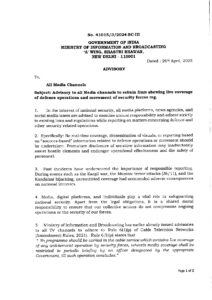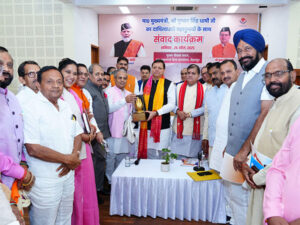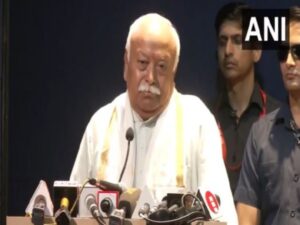BJP Chief Ministers’ Council meeting: PM Modi discusses efforts to make India USD 5 trillion economy
New Delhi [India], July 28 (ANI): Prime Minister Narendra Modi on Sunday said that if the central and state governments work together with coordinated efforts for public welfare, then the government will be able to achieve the goal of a developed India, a press release said.
PM Modi, in the two-day meeting of the BJP Chief Ministers’ Council that concluded on Sunday, said that the conservation of heritage and building a legacy of development are important for the concept of a developed India and everyone should continue to pay attention to this.
Under the BJP’s good governance agenda, such Chief Ministers’ Council meetings are held regularly. This was the second meeting this year. In this meeting, the Prime Minister discussed various efforts to increase the country’s economy to USD 5 trillion, increase public participation in development programs, and use various social media platforms to increase the reach of government schemes among the people.
The meeting was attended by national leaders, including the party’s national president Jagat Prakash Nadda, Defense Minister Rajnath Singh, Home Minister Amit Shah, and others.
Earlier on Saturday, during his inaugural address, Nadda said, “Through these meetings, we get three distinct achievements. Firstly, we get the benefit of the vast experience of our successful Prime Minister and other senior leaders. Secondly, we get to exchange our experiences and get some new information or new assessments. Thirdly, our desire to do something better becomes stronger.”
In this meeting, Education Minister Dharmendra Pradhan discussed the role of state governments in implementing the new education policy and presented the expectations from the state governments, which were discussed in detail. At the beginning of this council, some selected efforts of BJP-ruled states, which are innovative and good governance-centric, were presented.
Notable presentations included Uttar Pradesh’s rural secretariat scheme, Assam government’s special campaign for quick recruitment to government vacancies, Gujarat’s efforts to boost solar energy production, Tripura’s ‘Amar Sarkar’ program, and Bihar government’s efforts to prevent illegal mining, among others. During this discussion, some special projects of Maharashtra and Haryana were also discussed.






